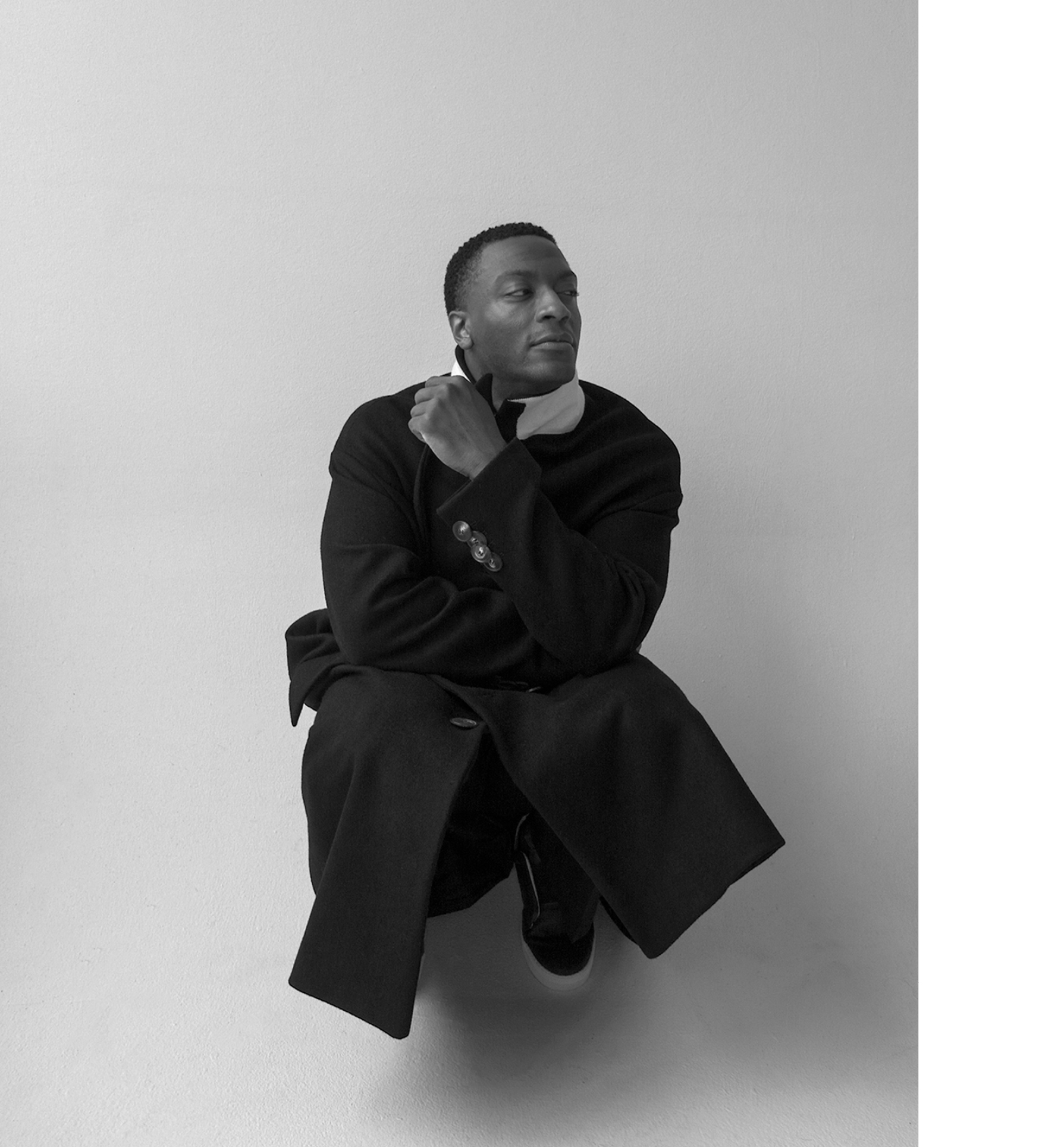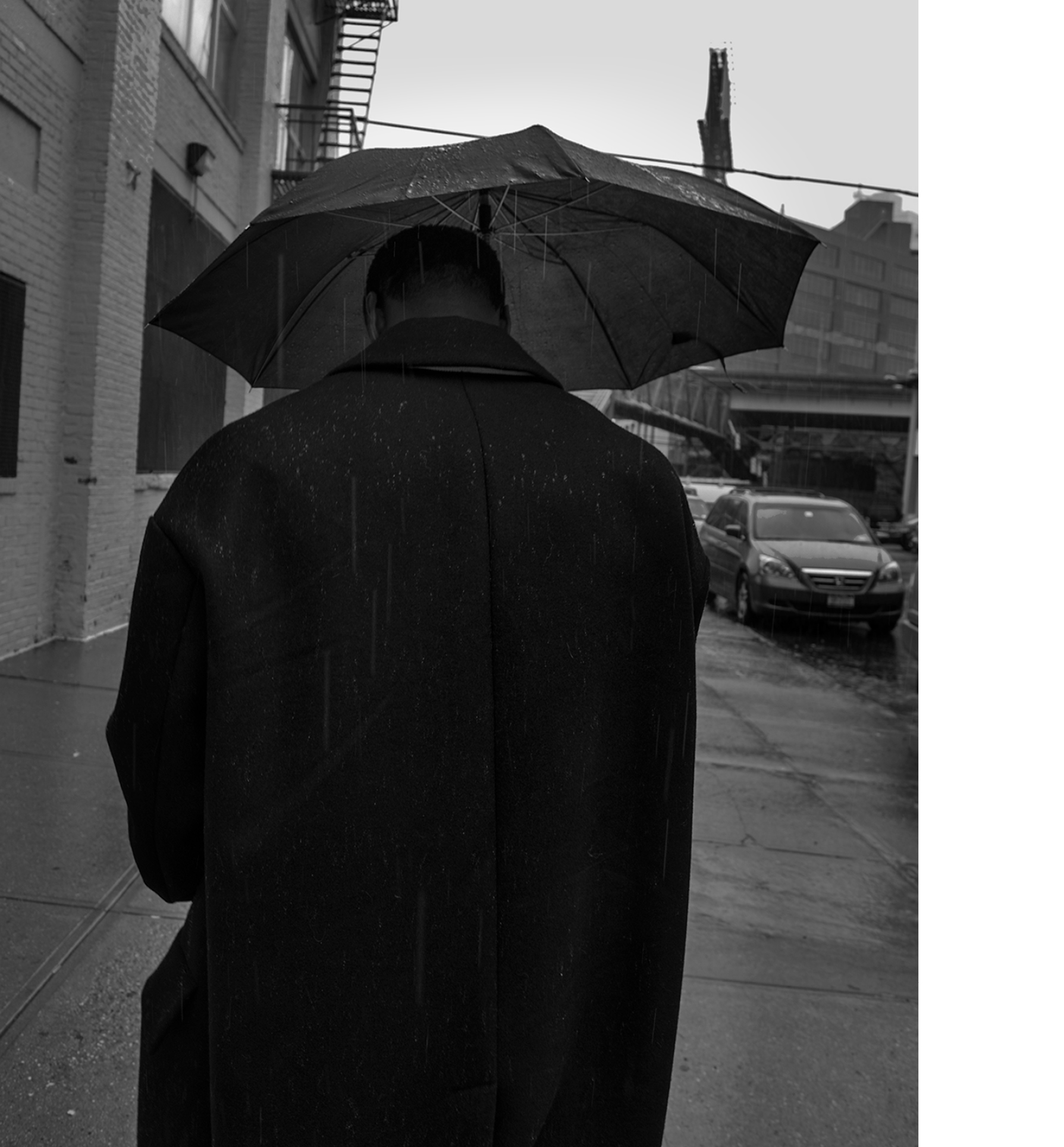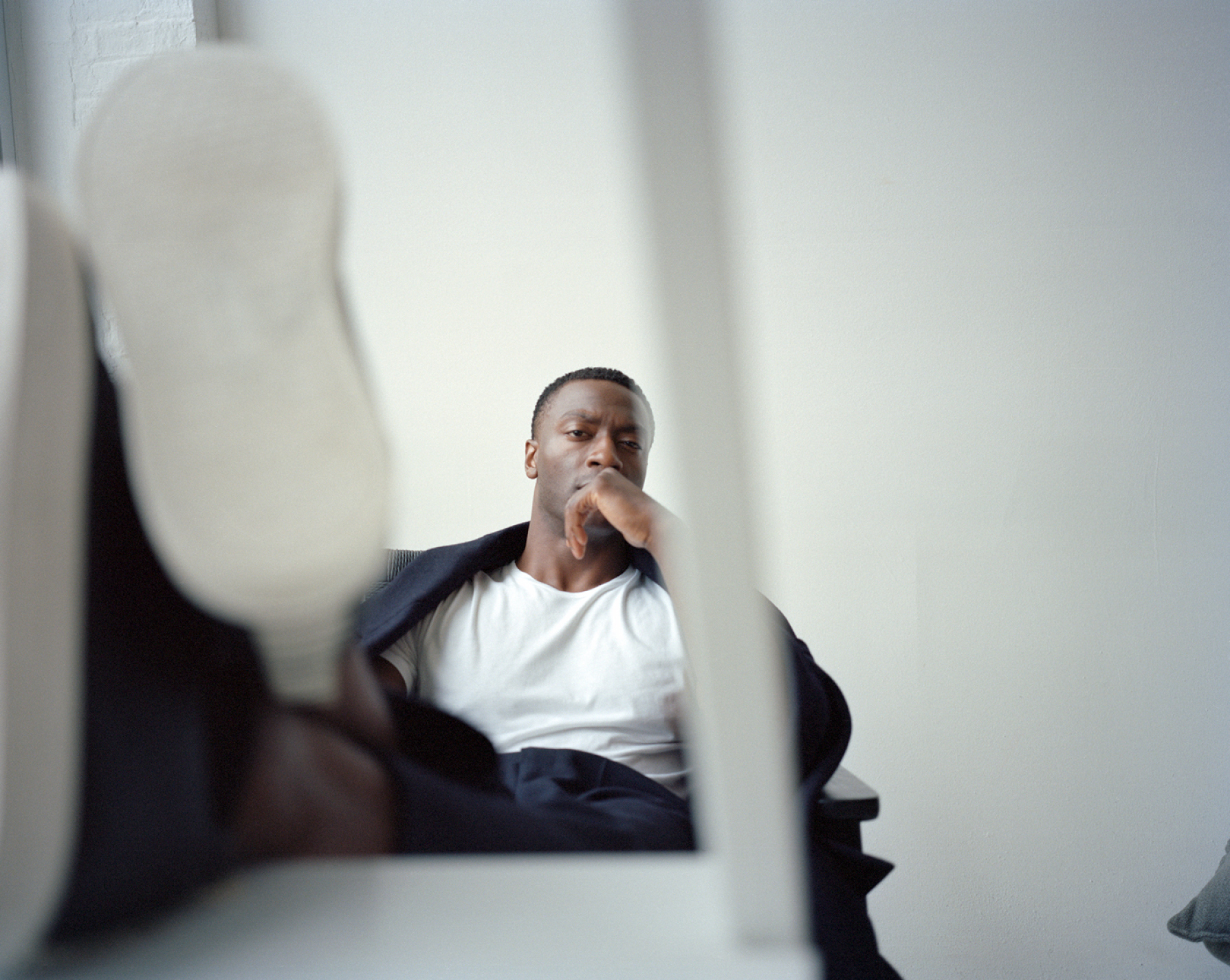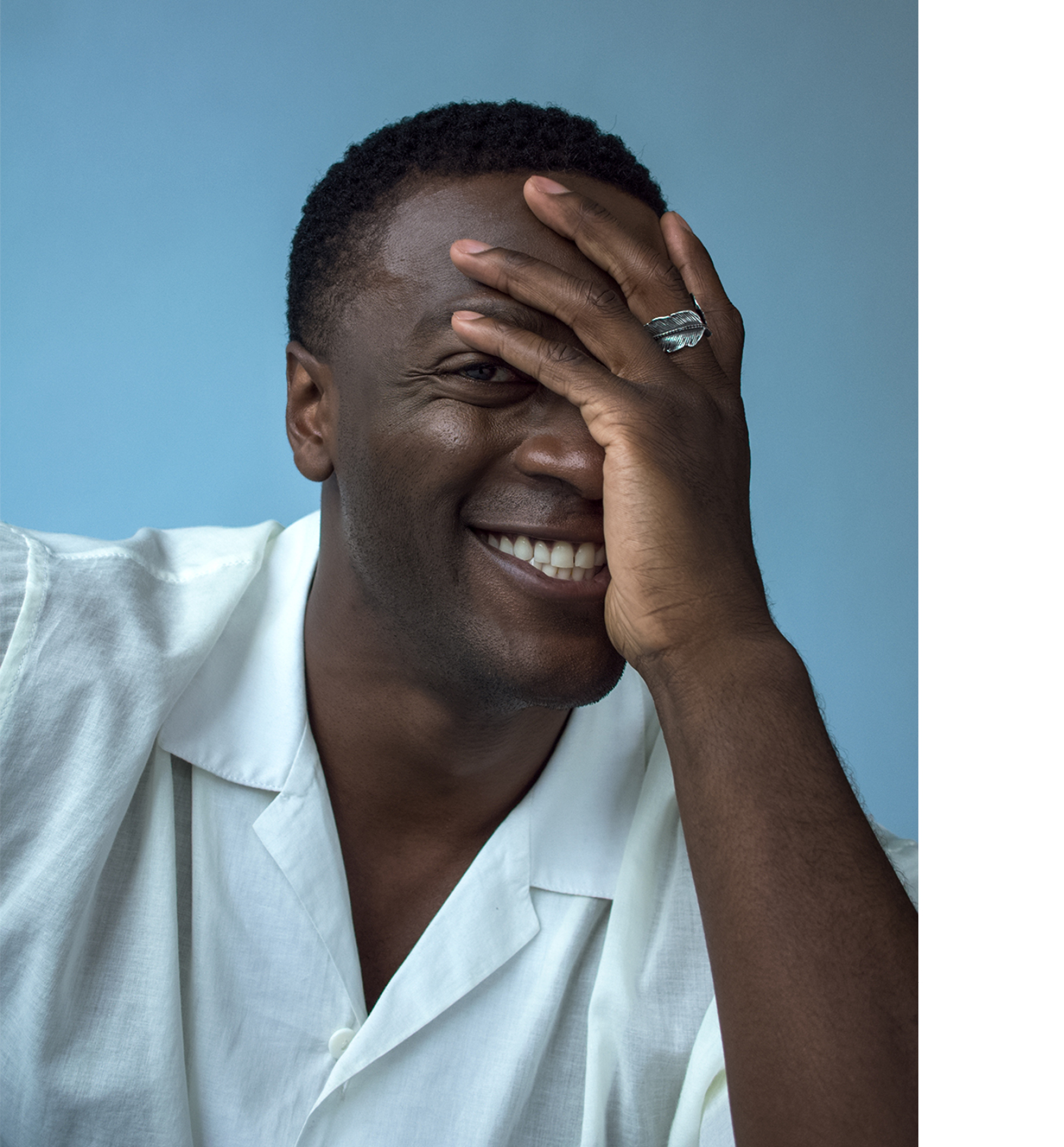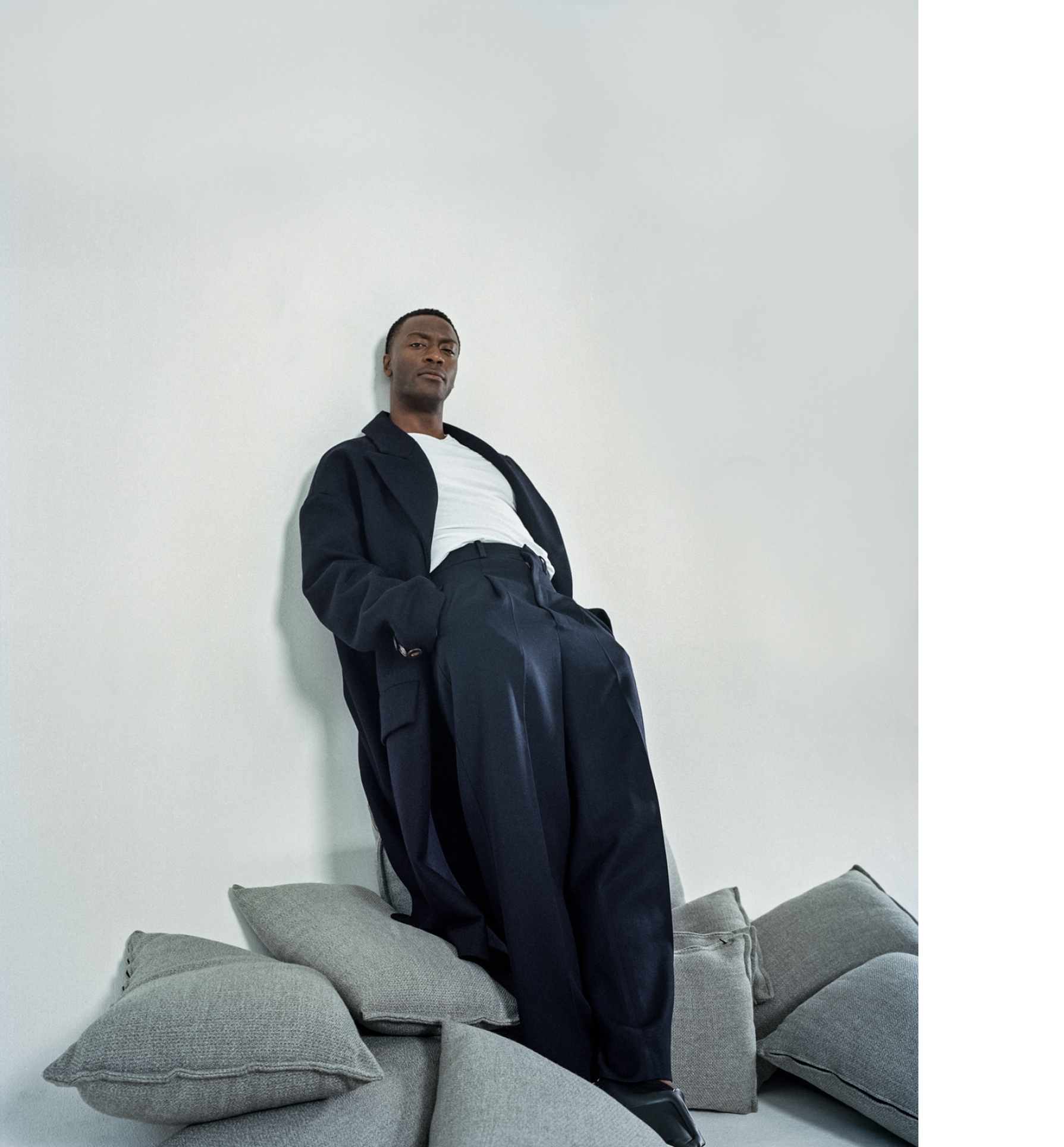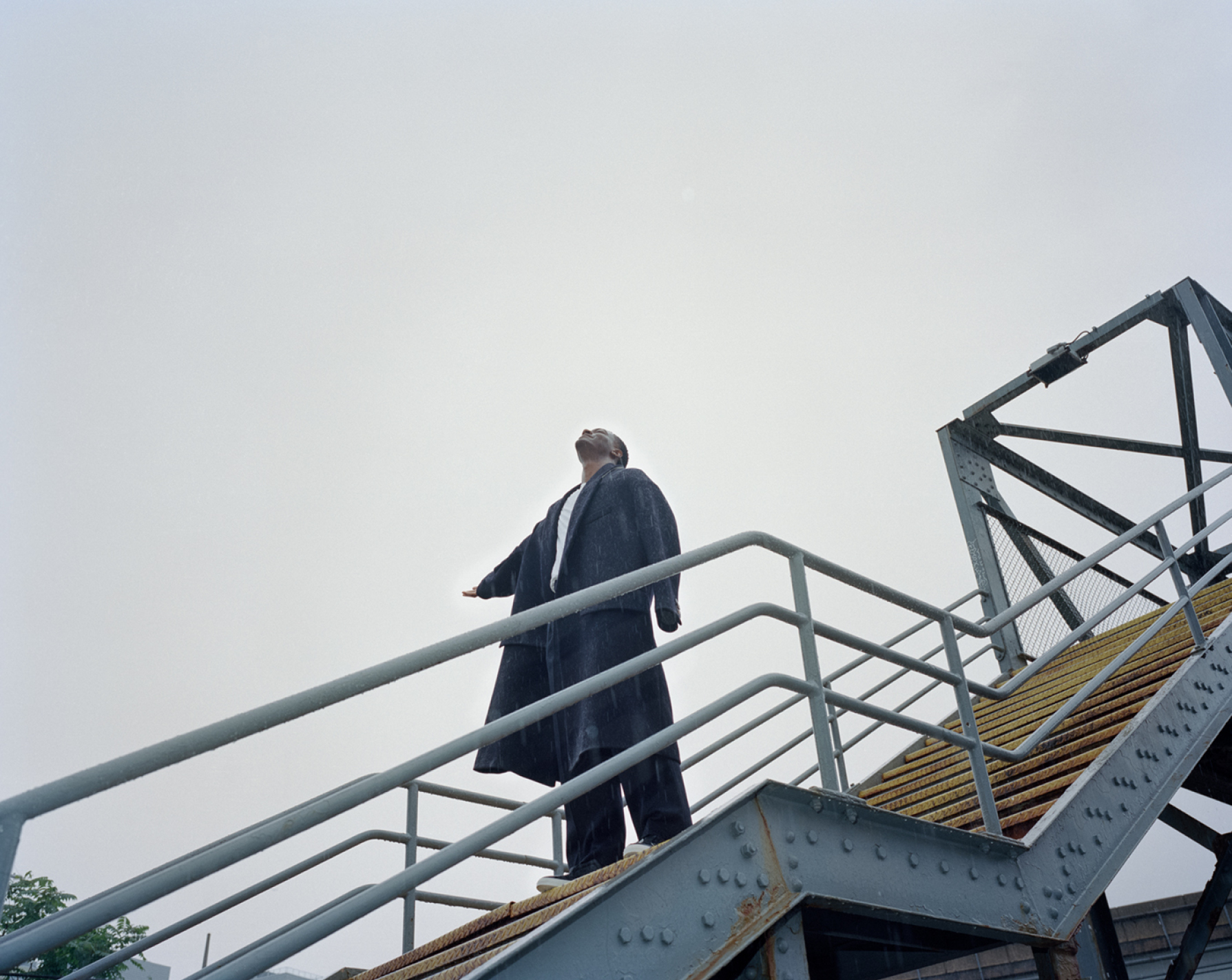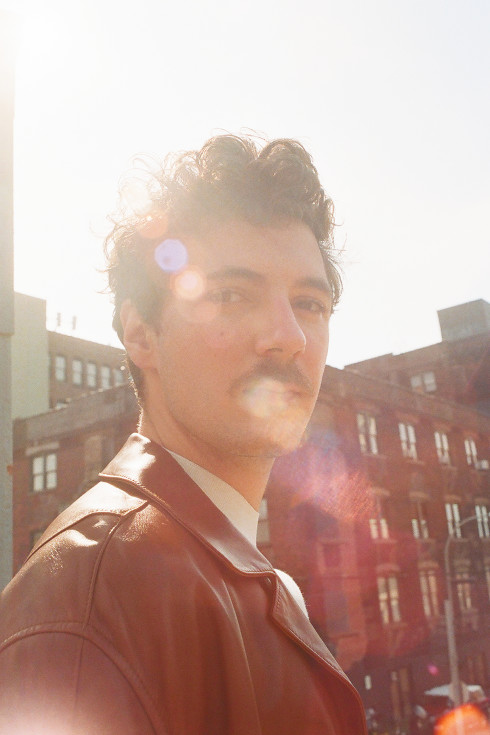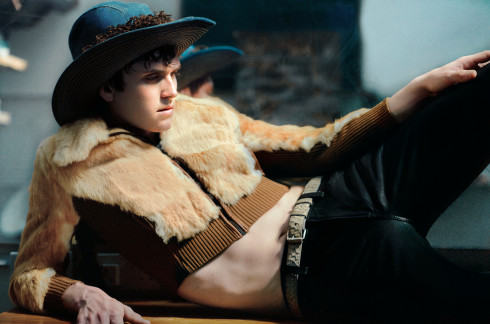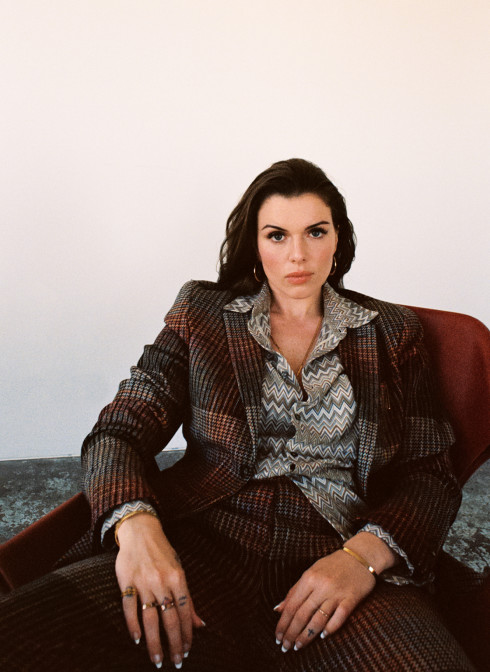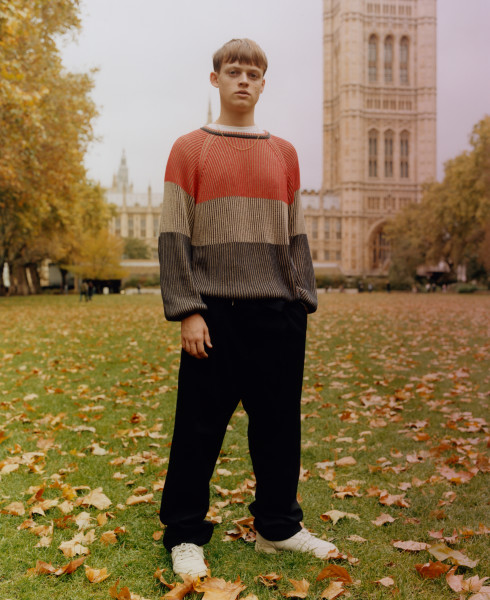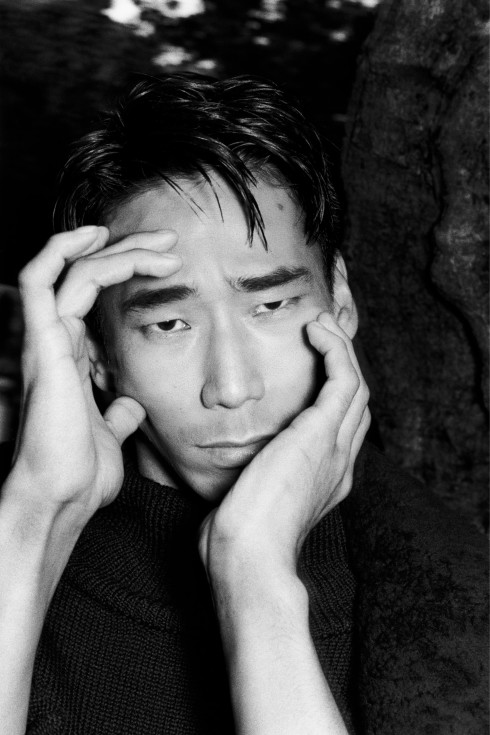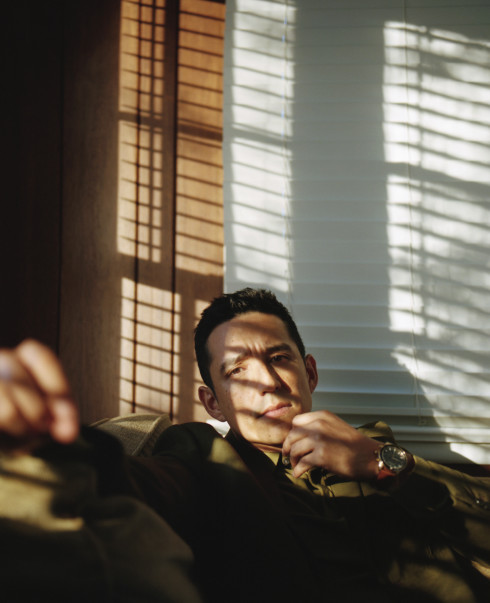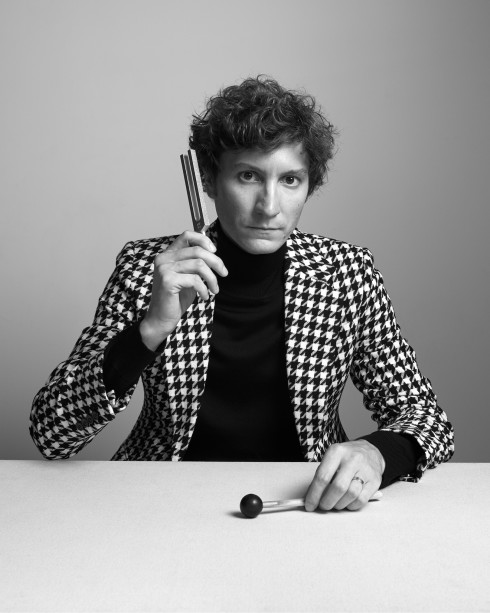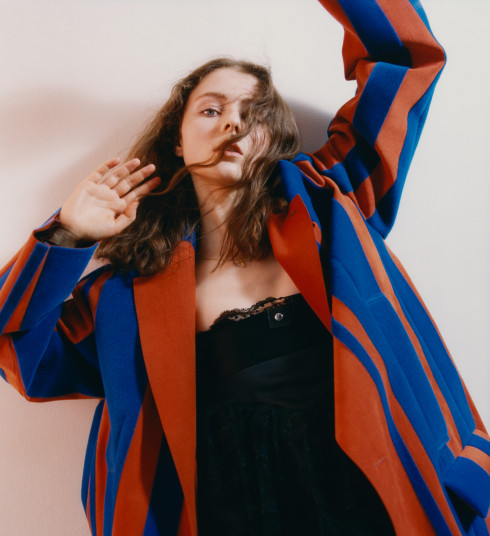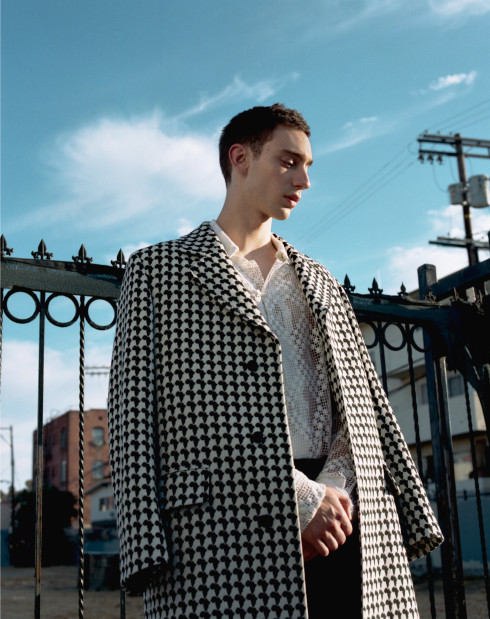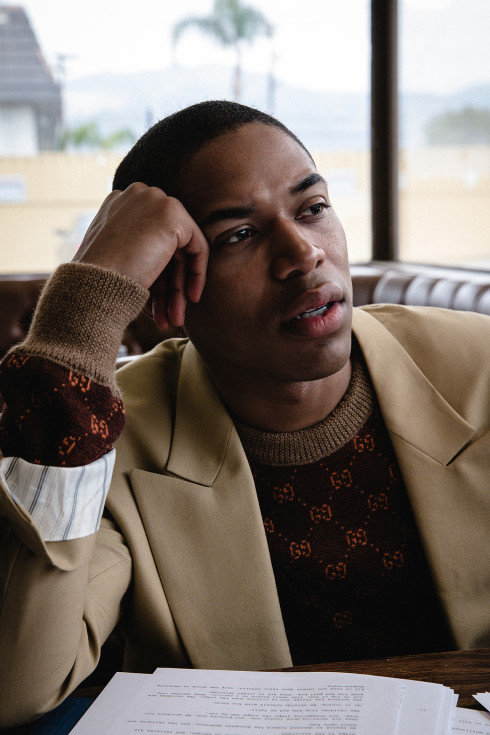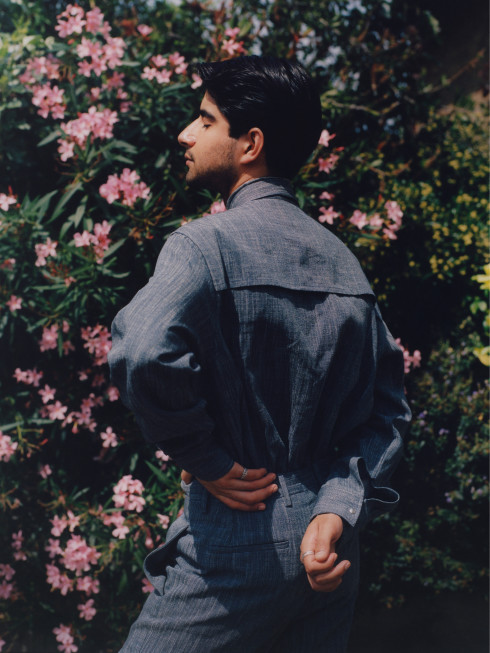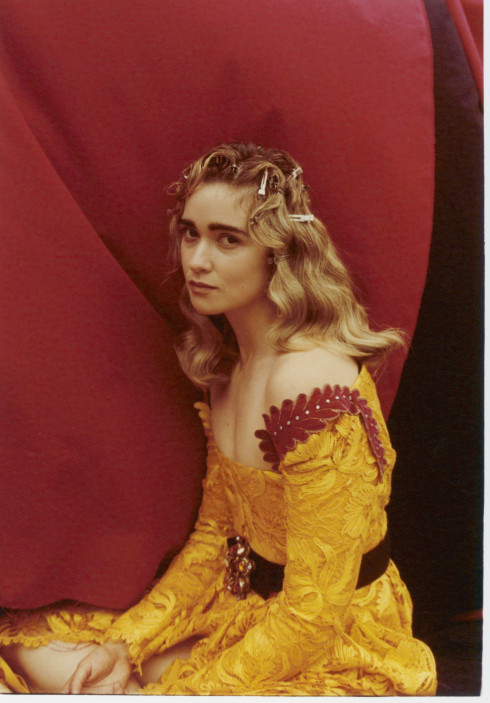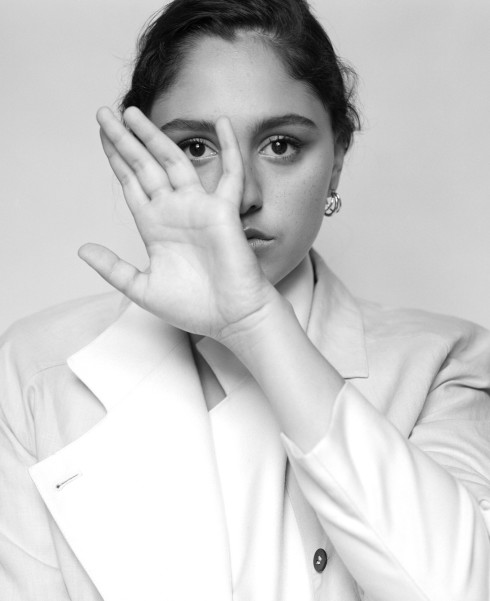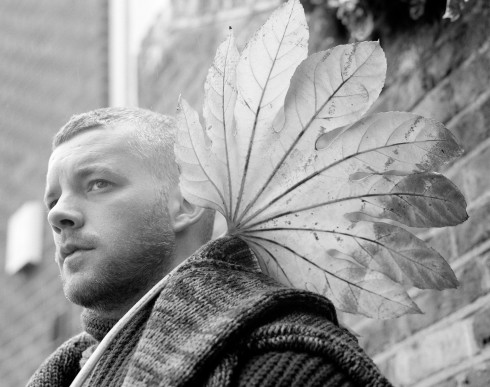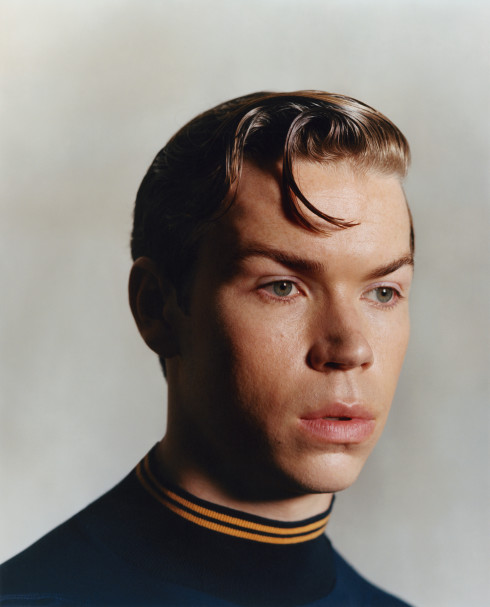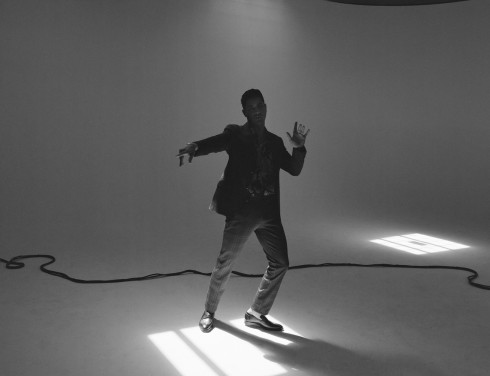
Shirt by s.k. Manor Hill.
- By
- Stephanie Fuchs
- Photography by
- Nicholas Pollack
- Styling by
- Bertille Noiret
Grooming by Tara Lauren at Epiphany Agency. Photographer’s assistant: Ben Sklar. Shot at Slate Studios, New York.
Aldis Hodge Wants His Fiction to Change the Real World
Dismantling the ugly machine that is institutionalized racism is no easy task, but it is one worth doing. Aldis Hodge has reached a point in his career where he is more compelled than ever to take on roles that inspire compassion and agency to help rebuild America’s broken justice system. In his forthcoming film Brian Banks, the 32-year-old plays the eponymous real-life NFL linebacker who was wrongfully convicted of rape at the age of sixteen. At the mercy of an all-white jury, Banks was forced to take a plea deal that almost ruined his entire future and the film details his struggle to exonerate himself as he tries to navigate a system that wants to keep him guilty. Hodge is also exploring similar themes of racial prejudice in Showtime’s new series City on a Hill, which shifts the perspective to the inside of the system. As Boston’s new assistant district attorney Decourcy Ward, he navigates the difficulties of advocating for judicial reform when crime and corruption are rampant throughout both the office and the streets. To garner more respect within the workplace, Decourcy takes on what is deemed an impossible case in hopes that it will allow him to inflict real change. Approaching these difficult narratives with careful consideration, Hodge’s sobering performances provoke an empathetic response that extends beyond the screen.
To become the self-assured actor he is today, Hodge had to get comfortable with advocating for himself before anything else. As a child, with his mother’s encouragement, i.e. Batman toys, Hodge followed his older brother Edwin into acting, appearing in shows like Sesame Street and films like 1995’s Die Hard with a Vengeance. There have been many lessons over the last twenty-four years, but the biggest one for Hodge was learning when to have a conversation with himself about his value in the industry. “This is a strange business. It can be really good, but it can also be tough on the spirit because it tears down everything about you that makes you great,” he relates. “It takes all the naturalness about you and says, ‘You need to be like this!’ or ‘You need to be this weight and this pretty!’ When I was young, I never got jobs because I was really dark and had big eyes and people used to call me ugly. My mom said, ‘Don’t worry baby, they’re going to want your look. They’re going to want your chocolate skin and beautiful eyes one day!’ And she was right. But you have to fight for yourself and fight for your own value.”
Currently satisfied with where he is professionally, Hodge has started to take chances on roles that he personally resonates with, as a way to both ground his sense of self and expand his own abilities. He finds this balance in Brian Banks, which begins in the midst of Brian’s probation period when he is forced to live as a registered sex offender and wear an ankle monitor that tracks his every move. Frustrated and ashamed, Brian channels his energy into finding a way to prove his innocence and overturn his conviction, which is when he discovers the California Innocence Project, a nonprofit organization lead by lawyer Justin Brooks, played by Greg Kinnear, who reopens cases to help give wrongfully convicted people their lives back. Hopeful, Brian begins writing to Justin and his team, determined to get himself the proper representation he needs.
For Hodge, playing Brian was important because he reflects a deeply rooted problem with how race and sexual assault are treated within the American justice system: “I was very familiar with Brian’s story because of the juxtaposition of his case alongside Brock Turner’s.” In 2015, Turner was discovered raping an unconscious woman behind a dumpster at Stanford University. Despite the overwhelming evidence against him, Turner testified as not guilty and received an appallingly light sentence. “Pardon my language, but it pissed me off because Brock Turner, who actually was caught in the act, was let off with a slap on the wrist of three months, which is nothing,” Hodge continues. “Because Turner is a privileged, young, white male, they said, ‘We don’t want his future to be affected!’ Well, what about the young woman whose life will forever be affected in a negative way? Do we not care about women now? What is going on? I grew up around women who have been sexually abused and for me, that’s a very personal issue, but to see him get a break like that, that doesn’t make sense to me. Who’s judging the judge?”
What adds to Hodge’s frustration is that while there was more than enough evidence to punish Turner accordingly, there was nothing to support the accusations made against Banks, yet he still paid the price. “They did a rape kit test and there was no evidence of sex, because, of course, Brian did not have sex with the young woman,” he explains. “But immediately just because he was a black kid from Long Beach they said, ‘Statistics say that he’s obviously a threat!’ and threw the book at him. In turn, his whole future was affected.” Despite these terrible injustices, Banks maintained his innocence through it all, refusing to give up until he had freed himself of all blame. His powerful display of self-preservation only added to Hodge’s eagerness to be a part of his story and share it with the world. “The thing that I love about Brian is that he turned it around,” the actor says. “He made his martyrdom matter and he still managed to achieve his dream of playing in the NFL and beyond that his dream of inspiring people. He didn’t waste his experience and I love that.”
To solidify his understanding of the role, Hodge reached out to Banks to get a clear sense of his personality and witness the redemptive qualities he had heard so much about. A month before shooting, they met for the first time and after ten minutes of talking, “it all just kind of sunk in,” Hodge says, adding that Banks’s irrefutable character had a powerful impact on him. “When I asked Brian if he was angry or bitter towards the woman who accused him he said, ‘No, I dealt with my anger in prison. I wish no ill will towards her. I’ve been angry for long enough I just want it to be over.’ He made a conscious choice to move forward and to not be angry. That’s a real teachable quality and I respect that about him.”
As Hodge continues to grow as an actor, he has the opportunity to be increasingly selective about the roles he takes and has been gravitating towards projects that spark a dialogue about real-world issues. Brian Banks, along with City on a Hill, produced by Matt Damon and Ben Affleck, falls into this category of “effective art,” as they both explore systematic racism through two very different contexts. Set in early-Nineties Boston, City on a Hill takes a gritty look at the city’s rampant crime and corruption through the eyes of FBI agent Jackie Rohr, played by Kevin Bacon, and Hodge’s ADA Decourcy Ward. New to the job, Decourcy is eager to tear down Boston’s justice system from the inside out, seeking jail time for corrupt cops as well as institutional reform to help eliminate the department’s rampant racism. His efforts are quickly sabotaged by his colleagues, including Jackie, who is perfectly fine with the status quo, claiming that “only the bad understand.” Looking to gain more respect and influence in the workplace, Decourcy is forced to partner up with Jackie to take on a gang of armored truck robbers. With a partnership like this, Hodge teases, “You never know if the truth is ever present, but deception is always a possibility.”
One of the most chilling aspects of City on a Hill, Hodge says, is how closely “it reflects the truth of today” and it is impossible not to draw comparisons between art and reality. Contemplative, he discusses these connections and how they speak to a much larger picture. “The main difference is technology. We have cameras, so the news has to play it out because we’re filming it ourselves. But racism has evolved to what is culturally appropriate, and when I say, ‘appropriate,’ that doesn’t mean I agree with it,” he stresses. Instead, he explains how racism has slowly disguised itself as the law, which people perceive to be equal and fair, leading them to overlook how enslavement, indentured servitude, and the prison system all reflect one another. People’s misconceptions of a just society only strengthen the belief that racism no longer exists when in reality, it is stronger than ever. These deeply rooted issues are the same ones that plague Decourcy and Hodge cannot help but connect deeply with his character’s urgency for judicial reform, stating that he sees nothing wrong with policing the police: “Like I said before, ‘Who’s judging the judge?’” Having engaged in many similar conversations, Hodge knows to anticipate the common response. “The question that always comes around is, ‘Well…is there a good cop or a bad cop?’” he adds. “I don’t know if there is such a thing. It’s just people doing their jobs. Sometimes they make mistakes and their mistakes should come with consequences.” He quickly clarifies, “Well, rather, there’s mistakes and then there’s bad choices. I understand a mistake, but if you’re a cop, you’re not in the business of making mistakes when it costs somebody their life.“
The striking realism of the series comes from its characters and their complex, layered dialogue, which showcases the expansive spectrum of the human condition. From cruel and bitter to hopeful and tender, the audience gets to witness the raw, uncensored conversations that people have behind closed doors. While it is not always a comfortable experience, it is a necessary one. Hodge praises the shows creator, Chuck MacLean, for his ability to play with “the duality of people,” demonstrating how the situation often dictates the best or worst in people. This idea applies to Hodge’s character as well, since Decourcy goes through a rather painful evolution himself. “His journey is not an easy one, it’s not a clean one, and it’s not a clear one where he can say, ‘I’m just this moral guy and that’s where I’m going to stay,’” he adds. “He wants to, but that’s just not life. He has high moral fiber, but it’s constantly challenged and sometimes he doesn’t always live up to his own expectations of himself.”
Approaching the heavy political and emotional weight of City on a Hill was a challenge that Hodge took with great responsibility. While he was on set addressing the racial tension that Decourcy experiences at home and in the workplace, Hodge told the creators and producers, “People still live this today.” Even though the show and its characters are fictional, Hodge emphasizes that the narrative mirrors reality so closely that the audience will easily be able to connect it to the real world, whether it’s personal or something they heard about in the news: “The only thing that’s different for us in the show is the year and we have to be careful of that because people are going to find something they relate to.” Still, he believes that it is his duty to navigate these difficult narratives because, in order to initiate change, a dialogue has to be started. He laughs and says that while effecting policy is a somewhat selfish ask of his, he hopes that the show will inspire people to become more engaged and active in their communities.
If Hodge has proved anything through his roles as Brian Banks and Decourcy Ward, it’s that effective art is not nearly as effective without him—including the Sundance hit Clemency where he plays Anthony Woods, a convicted cop-killer on death row. His performances demand the viewers’ undivided attention and respect as he takes them through some of the most horrifying aspects of humanity while still managing to keep the flame of hope burning. To tackle themes of racism and injustice with such delicate nuance not only points to Hodge’s strength as an actor but also his strong sense of self. “I’ve come to realize that when you stand alone you’re never actually alone because you draw people to you once you know who you are and your value,” he reflects. “You cannot be an outlier if you look like everybody else, act like everybody else, or think like everybody else.” Inciting all those around him with a deeper sense of empathy, Hodge will continue to break barriers with his magnetic presence, both on and off the screen.
City on a Hill continues on Sundays on Showtime. Brian Banks is out August 9. Clemency is out December 27.
- By
- Stephanie Fuchs
- Photography by
- Nicholas Pollack
- Styling by
- Bertille Noiret
Grooming by Tara Lauren at Epiphany Agency. Photographer’s assistant: Ben Sklar. Shot at Slate Studios, New York.
